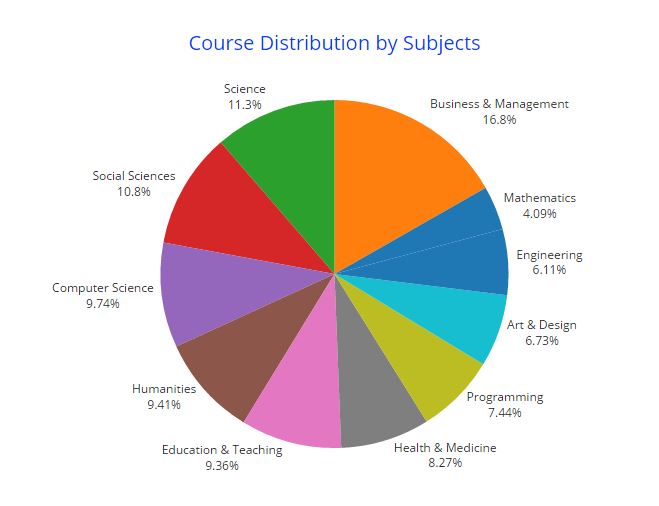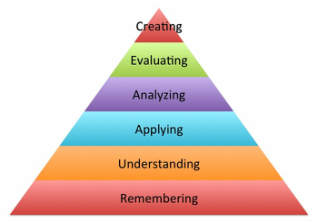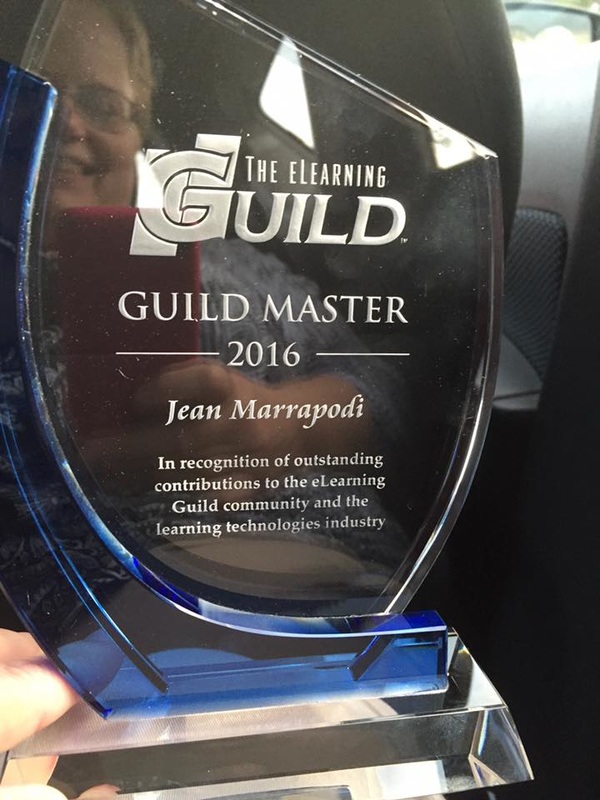Learning about learning
|
About five years ago I attended a higher ed workshop where the panelists introduced MOOCs (Massive Online Open Courses) and were discussing their potential impact on higher ed. There was a note of panic in their voices, because, after all, MOOCs are free and the mooc providers were "giving learning away", which might interrupt the revenue stream (read cash cow) in higher ed. The MOOC providers continued to publish, and the learners kept learning. You can read some interesting stats about them in Class Central's 2015 analysis of MOOC trends. Who's Taking Them and What are people learning in MOOCs?
What can we learn from MOOCs?There are some big lessons for us as designers around the popularity of the MOOC.
0 Comments
As an elearning manager, I have reviewed a lot of elearning during my career. Much of it dumps content out there followed by multiple choice questions. If training is learning new skills, then why aren't we testing the skills they are supposed to learn in our programs? What is the difference between what we do and what marketers do in content marketing? As Harold Stolovich would say, "Tellin' ain't trainin' and trainin' ain't performance." After considerable noodling, I've come up with four reasons why we assess learning so poorly.
Guild master? Me?
Then the feed started congratulating me. For what? All day long people were congratulating me for who knows what. It wasn't until late in the day that David Kelly presented me with my award as 2016 Guild Master. Apparently he handled that great awkward silence when I didn't pop up by asking everyone to have some fun with me and congratulate me without sharing what as they saw me throughout the day. That was fun. I suppose there is some irony in having the two 2016 Guild Masters presented in absentia this year. After all, we are about the virtual thing in elearning. I was astounded, humbled and honored to be included with the likes of those who have taught ME so much: Clark Quinn, Jane Bozarth, Chad Udell, Michael Allen, Mark Rosenberg, Allison Rossett, Joe Ganci, Conrad Gottfredson and Bob Mosher. All I know in this business I have learned from those who have been willing to share what they know with others. So what does a guild Master do, anyway?Today is the first day back to work after receiving this award, and I'm sitting here wondering what the heck a Guild Master is supposed to do, anyway, when it hit me. More of the same. For me, that's sharing what I know with others. It's not about being the professorial sage on the stage. It's about learning together. Noodling with others on the best way to do things. Mentoring other IDs on dealing with the SME who can't meet deadlines, who don't get this learning thing at all and want to dump more content than any human can absorb in a few days into a 15 minute elearning module. I have loved developing the IDs on my teams, watching the lightbulbs go off, and seeing them move into better learning for their clients. I've also watched them carry that mission forward. (My husband calls that the cult of Jean Marrapodi. ) It's reminding people that the goal of your learning must be able to be encapsulated in one high level sentence. In the end, what do you want them to KNOW and DO? then finding a way to assess that. It's about assessing the right things. Not vocabulary. It's about making things look good so people aren't distracted and the information is organized. It's about listening and learning from others. It's about tweeting new ideas. Retweeting great ideas of others. Taking scissors to red tape. Documenting processes to see how convoluted they are. Challenging "because we've always done it that way". It's about always learning. Not just what we do for a living, but applying tangential thinking to what we do to make it better. This year I've been working on human computer interface design and learned a ton from the world of design thinking, and interface design, and the way they explore people's needs to solve problems. We don't do that enough. It's about attending conferences, sharing workshops and learning from others. I leave on such a high from a conference and can't wait to try out the new discoveries. It's also about connecting with those who are in the trenches making a difference to continue to learn from them.
Loving LearningI'm at Learning Solutions 2015, in Orlando, Florida. It's big conference #2 of 3 for me for this year. I just love this stuff. I presented a program this year on Universal Design for Learning (UDL), which was a new topic to many. UDL is about making learning accessible and equivalent for all learners. Most elearning designers generate a transcript for audio portions of video, select colors that are color-blind friendly, and may even write tags for pictures that are screen reader friendly. UDL goes beyond that and considers the remedial learner, the gifted learner, the ESL learner, the dyslexic learner and any other learner who may take the program, and provides avenues that consider varied ways to present the WHAT of learning (representation) the HOW of learning (activities and expressions) and the WHY of learning (engagement). Thinking through and planning for these learners makes for a richer experience that benefits all. I'll write more about that another time. MotivationI've been coming to this conference nearly every year since 2002 during the early years of the eLearning Guild. This is such a great conference! I love being able to present, I love attending with sessions, I love the learning, but most of all, I love connecting with the people that I meet. I have learned so much over the past 13 years from my colleagues as we have wrestled together over issues, and learned from one another. The Guild truly is a community of practice, and has been a catapult for my career. I've had the opportunity to introduce my colleagues to the Guild and this year had the privilege of watching two people from my former team present for the first time. Now I get to watch them grow as they connect the dots from the people they have met and the workshops they attended. This year I got to meet some new friends whose workshops took me in directions I've never considered before, despite working in eLearning for 18 years. New Faces, New Discoveries
One Day to Go!If we weren't full enough, there's yet another half day tomorrow, ending with a keynote on Design Thinking. I'm looking forward to topping off my learning tank for the week with some new inspiration. Thank you eLearning Guild for the hard work to pull this off year after year.
So.... if you're here, what did you learn this week?
Are Your Learners Leaving at Intermission?I wrote earlier about the elearning that caused me to bail on getting my PMP certification because of the vocabulary spouting talking head. (Yup, I left at intermission on that one.) Last week, I was asked to take a technical training course to be able to access a software application at the office. The training consisted of 10 modules, with directions telling me I had to complete two mandatory sections and an elective. There were two mandatory items and eight optional ones. There were also two labeled advanced and eight labeled beginner. I suppose you can guess which of the ten the mandatory ones were. My goal is to be able to set up a shared resource site You'd think this would be easy, right? There is no seeming order to the modules. Each covers a different topic, with well designed how-to instructions and practice exercises. The production values were great. However, as a learner, I feel like I have no idea WHY I need to learn these things because I have no idea WHAT I'm going to do with the software so far. I have an idea of what I WANT it do do, and I suspect going to this repository to ask HOW to do these things would be a much more efficient way to access the knowledge repository of all of these skills. There is no Table of Contents of the modules. If you search the repository for the software name, you get 87 modules with titles and descriptions, but nothing that seems to overview the software or its purpose. So now I know how to mark a post Employee of the Month. Yay? Granted, there are nine other modules I need to work through, so perhaps I'll find something to meet my goals. I've found myself being baffled by the first module because I didn't have any context. I imagine that be it will the same with other modules, unless I can find something that sequences this. The best way I can explain this is to imagine yourself being dropped into the help section of a piece of software, picking random items and pretending this is the way to learn how to use it. There's a Difference Between Learning Something New And Finding an AnswerThe point of all of this is that we need to understand the learner need when we are creating training. If someone has experience and needs specific answers, send them to the repository. If they have no foundation, sending them to a knowledge repository without a curriculum plan or sequence of activities is like sending someone to the librarian to learn calculus. A librarian knows how to find specific information, and is a resource to be used thusly. When you need to learn something from the beginning, you need a teacher, or a curriculum set up by one who teaches. A teacher plans the activity and breaks things into bite sized, sequenced lessons. A librarian finds resources to find answers.
Big difference. Remember what role you play when you provide learning to your learners. I love Chris Pappas. At least I love his work to support the world of elearning. His blog post yesterday in the eLearningIndustry blog Tips to Use Learners' Imagination in eLearning hit a nerve for me. I've been slogging through a project management course for PMP certification and am getting to see the torture that we put our learners through when we assemble uninspired elearning. Don't get me wrong. The course is very professionally produced. There is video footage and synchronized slides expounding on the vocabulary of project management. The lectures don't repeat word-for-word what is on the slide, but rather support the intended message. They are chunked out into 5-8 minute segments. As far as lecture production goes, the course gets an A. However, after nearly two hours of this format, I have not done a thing to apply the project management vocabulary I've being "taught". I feel like I'm sitting in a lecture hall listening to a professor drone on and on, despite the professional actors' they have used to present the information. Have I learned anything? Not really, and that's not just because I've been doing project management for 20 years. I also don't think it's because I'm not taking copious notes on the talker and his slides. It's because the goal of this course appears to be to provide the mandatory 35 hours of prep time to sit for the PMP exam, which from everything else I've seen, is four hours of answering multiple choice questions about this kind of content. Some of the prep sites I've seen include math related analysis questions, so I live in hope that we shall leave the halls of the lectures and apply things soon. what should they be able to do?This kind of course design flies in the face of good instructional design because there is no application of the learning. There's also no engagement with the learner. The production values are great, and I suspect cost a fair amount of money based on the price tag for the prep. But if in the end, I can't DO project management, and can only pass a test, what have I achieved? I start every learning project by making my SME answer one question: At the end, what should the learner know and be able to do? If the subject matter expert cannot answer that in an single sentence, they do not know what they want. Whether it's curriculum, a module or a course, if we don't have the learner DOING at the end, why are they learning it? Imagine ThisAfter reading Chris' article, I imagined many possibilities for this boring PM course.
The list goes on. I have to wonder. There must be explanations why the designers never thought about the learner when they built this.
There are 33 more hours left of this course. I'm not terribly hopeful that there will be wonders in store for me. |
Jean Marrapodi
Teacher by training, learner by design. Archives
January 2018
Categories
All
|
Conference
|
Company
|
|






 RSS Feed
RSS Feed